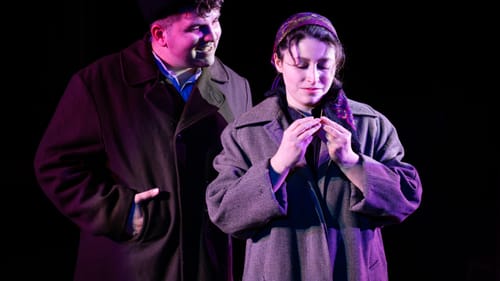Stay in the Loop
BSR publishes on a weekly schedule, with an email newsletter every Wednesday and Thursday morning. There’s no paywall, and subscribing is always free.
Our ancestors were immigrants, too
Curio Theatre Company presents Hannah Moscovitch’s Old Stock: A Refugee Love Story

As a Jewish woman, I approached opening night of Old Stock: A Refugee Love Story, now getting its Philadelphia premiere at Curio Theatre Company, with trepidation and a heavy heart. Could I objectively assess this love story about a young Romanian man and woman who meet on Canadian shores, seeking refuge from the horror of the pogroms?
Especially as Passover descended, I wondered if I would have rose-colored glasses for the Curio artists and Canadian playwright Hannah Moscovitch, who is a descendant of her play’s female protagonist. Once again, the world has gone mad: sympathy for the Palestinians has evolved into justification for the actions of Hamas, and condemnation of Israeli policies has morphed into the latest worldwide epidemic of antisemitism. Would I lose my concentration to an internal scream of hold on, be strong, cling to each moment of life, embrace reason, and communicate hope, despite all?
An immigrant's Our Town
In the first moments of Old Stock, an utterly non-syrupy love story, my anxieties about objectivity evaporated. I saw clearly that it’s beautifully, authentically written and portrayed. It’s like a profound, disorderly, delightful, fun, spirited Jewish rendition of Thornton Wilder’s 1938 Our Town—which, like Old Stock, underscores the preciousness of life through a wise, ever-present narrator who weaves together both tragedy and hope. Here our narrator is the Wanderer, in a deep, mighty, intriguing performance from Paul Harrold. He uses the joys of punk Klezmer (written by Ben Caplan and Christian Barry) to tell the story of Chaya (a talented, versatile Alana Kopelove) and Chaim (an endearing, multifaceted Jack Taylor).
The story of Chaya and Chaim is not about a couple who fall in love because they see each other as perfect—and then, if their marriage is to survive, learn to face that each surely is not. The couple meet in a special line for immigrants suspected of illness: he may have contracted typhus, which he plays down as a rash; and she may have tuberculosis (her sister has it, but Chaya is sure her own ailment is only a cough). Death and profound loss have been their only constant, and yet they live. Chaim is immediately attracted to the older Chaya, but she is initially barely responsive, having lost her husband and their baby from starvation on their treacherous journey. As a further deterrent, she is open about her every flaw.

Chaya had a strong attachment to her husband and remains in profound mourning for him and their child. Chaim, who lost his entire family in the pogroms, is alone. Although this theme is not well-developed, not only is Chaim attracted to Chaya, but also to her large, caring family. He persists in his marriage proposals and Chaya finally acquiesces. Their wedding night is a fiasco of jealousy and displaced, understandable pain, yet they cling together. Because neither is mean-spirited or unkind, and both are giving, their relationship thrives. They grow to love, and many children are born.
Remembering our immigrant ancestors
With the “Old Stock” reference in title and text, director Rachel Gluck highlights resistance to immigrants in Canada, a reality seen internationally. She hopes that the hunger and loss portrayed here will strengthen our resolve not to “succumb to the forces of nationalism and xenophobia that seek to dehumanize each new generation of immigrants and asylum seekers.” She notes the rejectors have “perhaps forgotten that their ancestors were immigrants as well.”
The show boasts an impressive set design by Curio artistic director Paul Kuhn, known for his devotion to reused materials, in the company’s black-box home on the lower level of Baltimore Avenue’s Calvary Center for Culture and Community. The space has some acoustic limitations: it was easy to hear Kopelove and Taylor as Chaya and Chaim, but some musical lyrics floated into oblivion, especially when the Wanderer’s back was turned. Some may find the lyrics lewd. I found them a delight.
Old Stock: A Refugee Love Story is a moving and uplifting production, especially meaningful during the Passover holiday, where repeated stories continue to provide insights and offer hope. Gift yourself with tickets.
At top: Paul Harrold in Curio’s Old Stock: A Refugee Love Story. (Photo by @rebeccagudelunasphotography.)
What, When, Where
Old Stock: A Refugee Love Story. By Hannah Moscovitch, directed by Rachel Gluck. $25-$30 (student and senior discounts available). Through May 11, 2024, at the Calvary Center for Culture and Community, 4740 Baltimore Avenue, Philadelphia. (215) 921-8243 or curiotheatre.org.
Accessibility
The Black Box at the Calvary Center is wheelchair-accessible by elevator via the entrance on 48th Street, next to the corner steps on 48th and Baltimore. Patrons who need to access it should call ahead at the box office for assistance.
Sign up for our newsletter
All of the week's new articles, all in one place. Sign up for the free weekly BSR newsletters, and don't miss a conversation.

 SaraKay Smullens
SaraKay Smullens